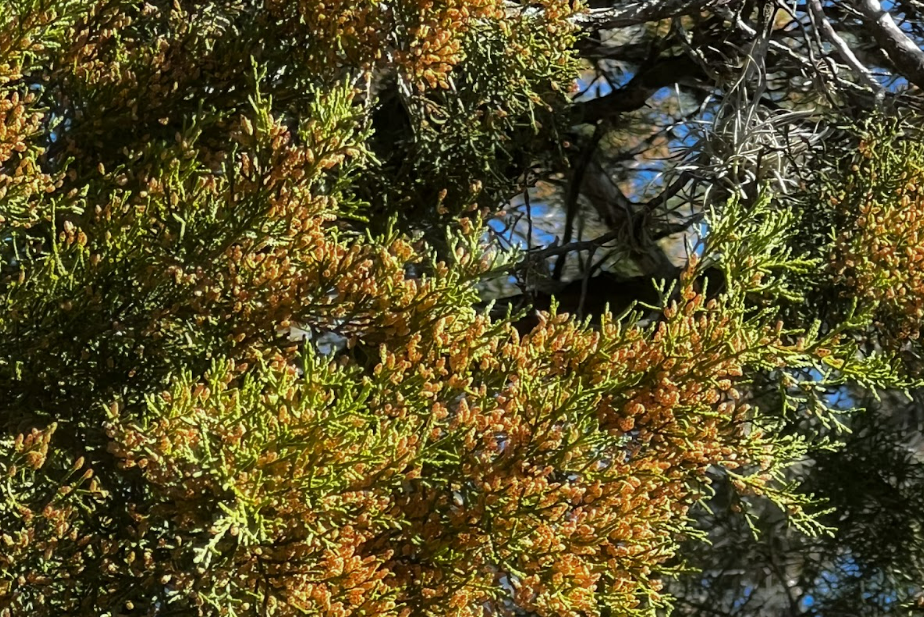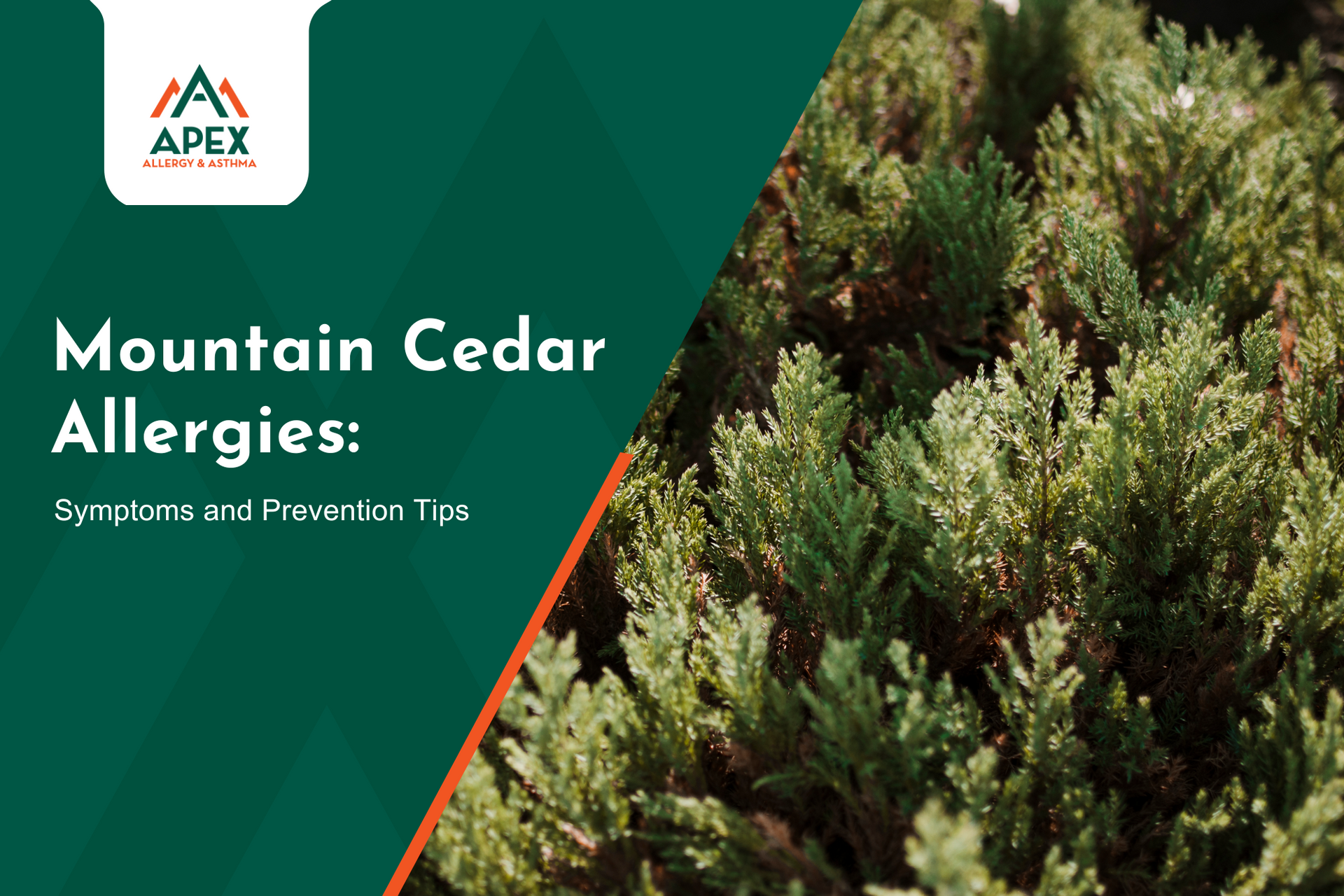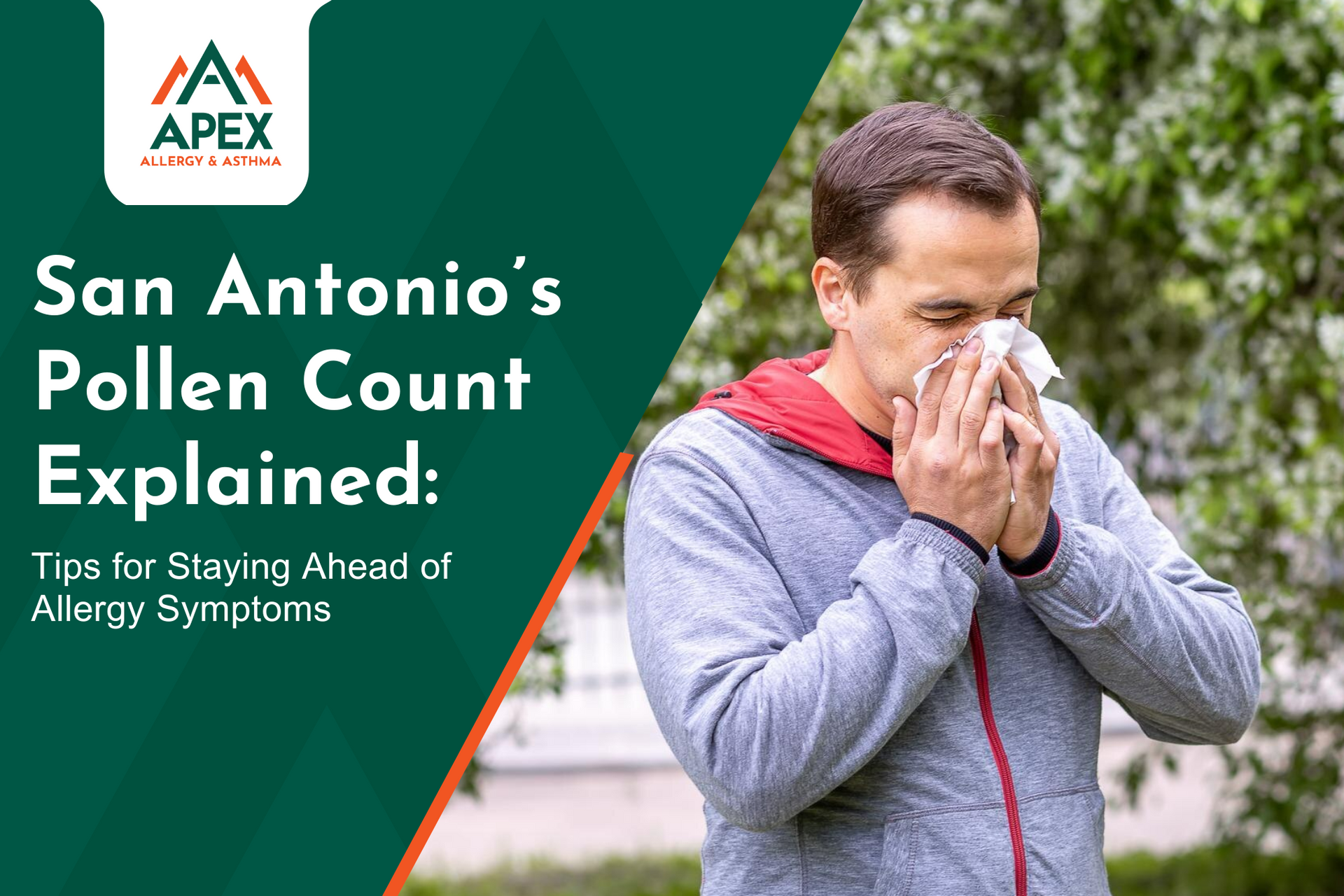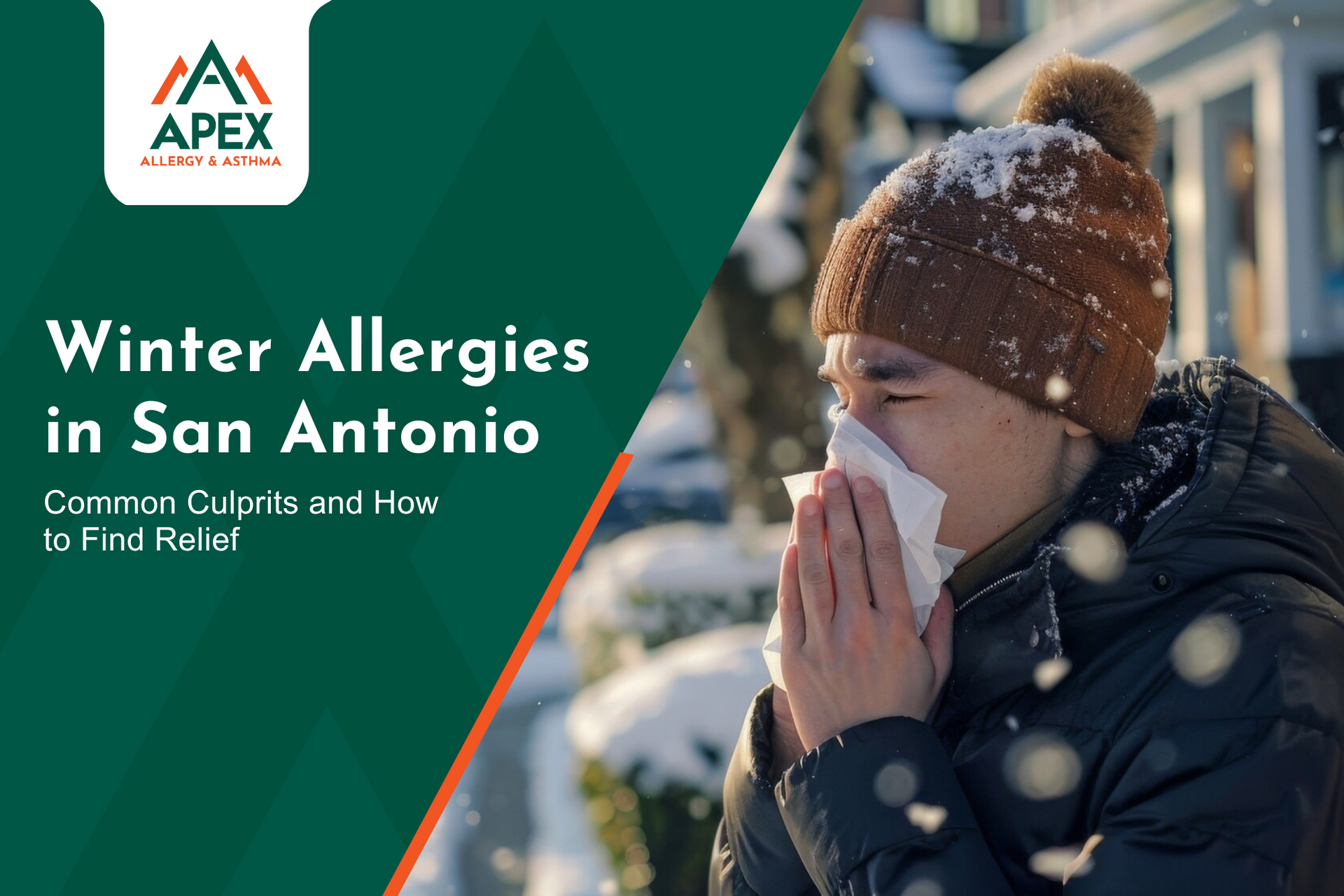Mountain Cedar Allergies: Symptoms and Prevention Tips
The holiday season brings joy and celebrations, but for many Texans, it also means the dreaded Texas cedar fever is in the air. Mountain cedar trees release pollen during winter, causing allergic reactions across the Lone Star State. This can turn your cozy season into a sneezy, itchy ordeal.
Don’t let cedar fever steal the magic of the season! By recognizing the symptoms and taking proactive steps to protect yourself, you can completely enjoy the winter festivities without discomfort.
Learn how to identify, manage, and prevent mountain cedar allergy with expert tips and tricks from seasoned allergists in Texas. But first, let’s get to know the source of this seasonal nuisance.
Blow Away Cedar Allergies This Season
What Is Mountain Cedar?
Meet the culprit behind your winter sniffles: mountain cedar or Juniperus ashei. Infamous for unleashing a blizzard of pollen during the colder months, these trees are abundant across Central Texas, particularly in the Hill Country, where they dominate the landscape.
A Winter Pollen Problem
Unlike most plants pollinating in spring, mountain cedar trees kick into gear during winter—just in time for the holidays! Warm, sunny days paired with frigid nights signal these trees to release pollen, often creating visible clouds on windy days.
With some of the highest pollen counts in the world, mountain cedar allergy is the top reason why many Texans struggle every winter. But don’t worry! With knowledge, preventive measures, and expert advice, you can weather the pollen storm and breathe easy this holiday season.
Recognizing the Symptoms of Mountain Cedar Allergy
If winter in Texas has you sneezing more than celebrating, you might be having an allergic reaction to mountain cedar. Here are the symptoms you should watch out for:
- Fatigue
- Sneezing fits
- Asthma flare-ups
- Nasal congestion
- Itchy, watery eyes
- Coughing and throat irritation
How Symptoms Can Fool You
Mountain cedar allergy symptoms often feel like a bad cold or even the flu, especially with common symptoms like congestion, sneezing, and fatigue. However, mountain cedar allergies typically lack the fever or body aches observed in viral infections.
Severity Can Vary
Symptoms can range from mild irritation to severe discomfort, depending on your sensitivity to cedar pollen. For some, it’s a seasonal nuisance; for others, it’s a full-blown health challenge that disrupts daily life. Left untreated, nasal symptoms can lead to sinus infections; for those prone to asthma, mountain cedar can trigger significant wheezing and shortness of breath.
Recognizing these symptoms and seeking a proper diagnosis is key. With an educated approach, you can manage cedar fever effectively and get back to enjoying the winter festivities.
Preventing and Managing Mountain Cedar Allergies
With a few proactive steps, you can keep your symptoms in check and reclaim your holiday joys. Here are practical, allergist-approved ways to effectively prevent and manage cedar fever.
Minimize Exposure to Cedar Pollen
Limiting your contact with pollen is your first line of defense. Here’s how:
- Watch Pollen Counts and Stay Indoors: Avoid outdoor activities during peak pollen times, especially during early mornings or windy days.
- Keep Windows Closed: Shut the windows in your home and car to prevent pollen from drifting inside.
- Use Air Purifiers: Invest in a high-quality air purifier with HEPA filters to reduce indoor allergens and improve air quality.
- Shower and Change Clothes: Pollen clings to your clothes, hair, and skin. Showering and changing into clean clothes can help keep allergens out of your living spaces.
Medications to Manage Symptoms
When avoidance isn’t enough, have medications on hand to promote relief.
- Antihistamines: These can reduce sneezing, itching, and a runny nose.
- Nasal Sprays: Nasal corticosteroids or antihistamine sprays help with nasal congestion and inflammation.
- Decongestants: These are useful for short-term relief of sinus pressure and stuffiness.
Lifestyle Changes and Alternative Approaches
For added relief, consider integrating these strategies into your routine:
- Hydrate: Drinking plenty of water helps keep your nasal passages clear.
- Use a Saline Rinse: Rinsing your nasal passages can remove trapped pollen.
- Strengthen Your Immune System: A balanced diet, regular exercise, and adequate sleep can help your body better cope with allergens.
By combining prevention with effective management strategies, you can reduce symptoms and enjoy winter without the misery brought on by cedar fever.
Immunotherapy: A Long-Term Solution for Allergies
If managing mountain cedar allergies always feels like an uphill battle every winter,
immunotherapy might be the game-changer you need. Unlike antihistamines or nasal sprays, immunotherapy targets the root of the problem—offering lasting relief.
How Immunotherapy Works
Immunotherapy trains your immune system to calm down when it encounters cedar pollen. Here’s how it’s done:
- Allergy Shots: Tiny doses of cedar pollen are injected into your body over several sessions, gradually helping your body build tolerance.
- Sublingual Immunotherapy (SLIT): Pollen extracts are administered under your tongue in the form of tablets or drops, offering a needle-free option.
This treatment reduces sensitivity to cedar pollen over time, making each allergy season less intense than the last.
How to Know if Immunotherapy Is Right for You?
Immunotherapy isn’t a one-size-fits-all solution, but it’s worth exploring if you:
- Are tired of cedar pollen dictating your winters.
- Struggle with severe or recurring cedar fever symptoms.
- Want a long-term solution instead of seasonal symptom management.
It is best to consult an allergist to know if immunotherapy is right for you. At
Apex Allergy and Asthma, our team specializes in personalized allergy care to help you reclaim your seasons and breathe easier year after year.
When to Seek Professional Help
While some cases of mountain cedar allergies can be managed at home, there are times when expert help is essential. Knowing when to see an allergy specialist can prevent prolonged discomfort and even more serious complications.
If you experience any of the following, these situations call for medical attention:
- Severe or Persistent Symptoms: When your congestion, sneezing, or itchy eyes don’t let up despite using over-the-counter remedies.
- Difficulty Breathing: Wheezing, shortness of breath, or chest tightness may signal that cedar pollen is triggering asthma-like symptoms.
- Symptoms Interfering with Daily Life: Struggling to sleep, work, or enjoy your usual activities because of allergies.
- Medications Aren’t Helping: If your go-to treatments aren’t bringing relief, it’s time for a tailored, expert approach.
Why an Accurate Diagnosis Matters
Cedar fever isn’t the only condition that flares up during winter. Proper testing helps pinpoint if your symptoms are caused by allergies, asthma, or something else. Clarifying the root cause will help allergy specialists create a more targeted and effective treatment plan.
How Apex Allergy and Asthma Can Help
We specialize in comprehensive care to help you tackle cedar fever head-on. Here are the services we offer:
- Allergy Testing. Discover what’s really triggering your symptoms through a series of tests with the help of our allergy specialist, Dr. Mark Stahl.
- Allergy Shots (Immunotherapy). It is a long-term solution that builds your tolerance to mountain cedar pollen.
- Personalized Treatment Plans. Our team will provide you with medications, lifestyle tips, and expert advice tailored to your needs.
Don’t let sneezes and sniffles define your winter. At
Apex Allergy and Asthma, we’re here to help you take control of your allergies and improve your quality of life.
Fight Off Cedar Fever with Confidence

Winter should be about cozy moments, not allergy-induced suffering. From avoiding pollen exposure to exploring long-term solutions like immunotherapy, managing your cedar fever symptoms doesn’t have to be as stressful as it was last season.
With the right care and expert support from
Apex Allergy and Asthma, you can breathe easier and embrace all the season has to offer. Schedule an appointment today and take the first step toward a sneeze-free, joyful winter!
Receive Comprehensive Allergy Care




